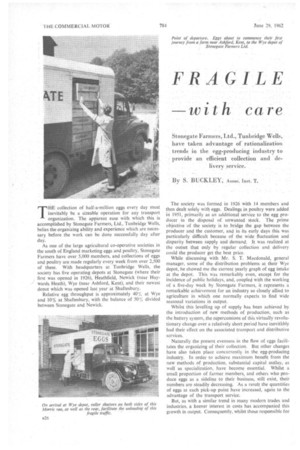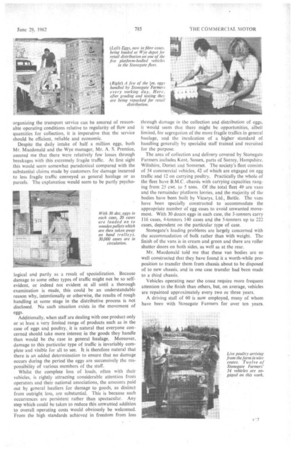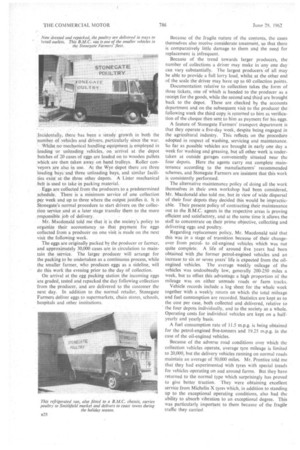FRAGILE with care
Page 88

Page 89

Page 90

If you've noticed an error in this article please click here to report it so we can fix it.
Stonegate Farmers, Ltd., Tunbridge Wells, have taken advantage of rationalization trends in the egg-producing industry to provide an efficient collection and de livery .service.
By S. BUCKLEY, Assoc. Inst. T.
THE collection of half-a-million eggs every day must inevitably be a sizeable operation for any transport organization. The apparent ease with which this is accomplished by Stonegate Farmers, Ltd., Tunbridge Wells, belies the organizing ability and experience which are necessary before the work can be done successfully day after day.
As one of the large agricultural co-operative societies in the south of England marketing eggs and poultry, Stonegate Farmers have over 5,000 members, and collections of eggs and poultry are made regularly every week from over 2,500 of these. With headquarters at Tunbridge Wells, the society has five operating depots at Stonegate (where their first was opened in 1926), Heathfield, Newick (near Haywards Heath), Wye (near Ashford, Kent), and their newest depot which was opened last year at Shaftesbury.
Relative egg throughput is approximately 40% at Wye and 10% at Shaftesbury, with the balance of 50% divided between Stonegate and Newick,
The society was formed in 1926 with 14 members and then dealt solely, with eggs. Dealings in poultry were added in 1951, primarily as an additional service to the egg producer in the disposal of unwanted stock. The prime objective of the society is to bridge the gap between the producer and the customer, and in its early days this was particularly difficult because of the wide fluctuation and disparity between supply and demand. It was realized at the outset that only by regular collection and delivery could the producer get the best price.
While discussing with Mr. S. T. Macdonald, general manager, some of the distribution problems at their Wye depot, he showed me the current yearly graph of egg intake at the depot. This was remarkably even, except for the incidence of public holidays, and, coupled with the working of a five-day week by Stonegate Farmers, it represents a remarkable achievement for an industry so closely allied to agriculture in which one normally expects to find wide seasonal variations in output.
Whilst this levelling up of supply has been achieved by the introduction of new methods of production, such as the battery system, the repercussions of this virtually revolutionary change over a relatively short period have inevithl3ly had their effect on the associated transport and distributive services.
Naturally the present evenness in the flow of eggs facilitates the organizing of their collection. But other changes have also taken place concurrently in the egg-producing industry. In order to achieve maximum benefit from the new methods of production, substantial capital outlay, as well as specialization, have become essential. Whilst a small proportion of farmer members, and others who produce eggs as a sideline to their business, still exist, their numbers are steadily decreasing. As a result the quantities of eggs at each pick-up point have increased, again to the advantage of the transport service.
But, as with a similar trend in many modern trades and industries, a keener interest in costs has accompanied this growth in output. Consequently, whilst those responsible for organizing the transport service can be assured of reasonable operating conditions relative to regularity of flow and quantities for collection, it is imperative that the service should be efficient, reliable and economic.
Despite the daily intake of half a million eggs, both Mr. Macdonald and the Wye manager, Mr. A. S. Prentice, assured me that there were relatively few losses through breakages with this extremely fragile traffic. At first sight this would seem somewhat paradoxical compared with the substantial claims made by customers for damage incurred to less fragile traffic conveyed as general haulage or as parcels. The explanation would seem to be partly psycho logical and partly as a result of specialization. Because damage to some other types of traffic might not be so selfevident, or indeed not evident at all until a thorough examination is made, this could be an understandable reason why, intentionally or otherwise, the results of rough handling at some stage in the distributive process is not disclosed. No such situation exists in the movement of eggs.
Additionally, when staff are dealing with one product only or at least a very limited range of products such as in the case of eggs and poultry, it is natural that everyone concerned should take more interest in the goods they handle than would be the case in general haulage. Moreover, damage to this particular type of traffic is invariably complete and visible for all to see. It is therefore natural that there is an added determination to ensure that no damage occurs during the period 'the eggs are successively the responsibility of various members of the staff.
Whilst the complete loss of loads, often with their vehicles, is rightly attracting considerable attention from operators and their national associations, the amounts paid out by general hauliers for damage to goods, as distinct from outright loss, are substantial. This is because such occurrences are persistent rather than spectacular. Any step which could be taken to reduce this unwanted addition to overall operating costs would obviously be welcomed. From the high standards achieved in freedom from loss
through damage in the collection and distribution of eggs, it would seem that there might be opportunities, albeit limited, for segregation of the more fragile traffics in general haulage, and the inculcation of a higher standard of handling generally by specialist staff trained and recruited for the purpose.
The area of collection and delivery covered by Stonegate Farmers includes Kent, Sussex, parts of Surrey, Hampshire, Wiltshire, Dorset and Somerset. The society's fleet consists of 54 commercial vehicles, 42 of which are engaged on egg traffic and 12 on carrying poultry. Practically the whole of the fleet have B.M.C. chassis with carrying capacities ranging from 25 cwt. to 5 tons. Of the total fleet 49 are vans and the remainder platform lorries, and the majority of the bodies have been built by Vicarys, Ltd., Battle. The vans have been specially constructed to accommodate the appropriate number of egg cases to avoid unwanted movement. With 30 dozen eggs in each case, the 3-tonners carry 116 cases, 4-tonners 140 cases and the 5-tonners up to 222 cases, dependent on the particular type of case.
Stonegate's loading problems are largely concerned with the accommodation of bulk rather than with weight. The finish of the vans is in cream and green and there are roller shutter doors on both sides, as well as at the rear.
Mr. Macdonald told me that these van bodies are so well constructed that they have found it a worth-while proposition to transfer them from chassis about to be disposed of to new chassis, and in one case transfer had been made to a third chassis.
Vehicles operating near the coast require more frequent attention to the finish than others, but, on average, vehicles are repainted approximately every two or three years.
A driving staff of 60 is now employed, many of whom have been with Stonegate Farmers for over ten years.
,Incidentally, there has been a steady growth. in both the number of vehicles and drivers, particularly since the war.
Whilst no mechanical handling equipment is employed in loading or 'unloading vehicles, on arrival at the depot batches of -20 cases of eggs are loaded on to wooden pallets which are thentaken away on hand trolleys. Roller conveyors are also in use. At the Wye -depot there are three loading bays and three unloading bays, and similar facilities exist at the three other depots. A Lister mechanical belt is used to take in packing material.
Eggs are collected from the producers to a predetermined schedule. .There is a minimum service of one collection per week and up to three where the output justifies it. It is Stonegate's normal procedure to start drivers on the collection service and at a later stage transfer them to the more -responsible job of delivery.
Mr. Macdonald told me that it is the society's policy to organize their accountancy so that payment for eggs collected from a producer on one visit is made on the next visit the following week.
The eggs are originally packed by the producer or farmer, and approximately 30,000 cases are in circulation to maintain the service. The larger producer will arrange for the packing to be undertaken as a continuous process, while the smaller farmer, who produces eggs as a sideline, will do this work the evening, prior to the day of collection.
On arrival at the egg packing station the incoming eggs are graded, tested and repacked the day following collection from the producer, and are delivered to the customer the next day. In addition to the normal retailer, Stonegate Farmers deliver eggs to supermarkets, chain stores, schools, hospitals and other institutions. Because of the fragile nature of the contents, the cases themselves also receive considerate treatment, so that there is comparatively little damage to them and the need for replacement is infrequent.
Because of the trend towards larger producers, the number of collections a driver may make in any one day can vary substantially. The largest producers:of 'all may be able to provide a full lorry load, whilst at the other end of the scale the driver may have up to 60 collection points.
Documentation relative to collection takes the form of three tickets, one of which is handed to the producer as a receipt for the goods, while the second and third are brought back to the depot. These are checked by the accounts department and on the subsequent visit to the producer the following week the third copy, is returned to him as verification of the cheque then sent to him as payment for his eggs.
A feature of Stonegate Farmers' transport department is that they operate a five-day week, despite being engaged in the agricultural industry. This reflects on the procedure adopted in respect of washing, servicing and maintenance. So far as possible vehicles are brought in early one day a week for washing and greasing, but all other work is undertaken at outside garages conveniently situated near the four depots. Here the agents carry out complete maintenance according to the manufacturers' recommended schemes, and Stonegate Farmers are insistent that this work is consistently performed.
The alternative maintenance policy of doing all the work themselves in their own workshop had been considered, Mr. Macdonald also told me, but in view of wide dispersal of their four depots they decided this would be impracticable. Their present policy of contracting their maintenance out to the B.M.C. agents in the respective areas is proving efficient and satisfactory, and at the same time it allows the staff to concentrate on their prime objective, collecting and delivering eggs and poultry.
Regarding replacement policy, Mr. Macdonald said that this was in a stage of transition because of their changeover from petrolto oil-engined vehicles which was not quite complete. A life of around five years had been obtained with ,the former petrol-engined vehicles and an increase to six or seven years' life is expected from the oilengined vehicles. The average weekly mileage of the vehicles was undoubtedly low, generally 200-250 miles a week, but to offset this advantage a high proportion of the mileage was on either unmade roads or farm tracks.
Vehicle records include a log sheet for the whole week together with a weekly return on which the total mileage and fuel consumption are recorded. Statistics are kept as to the cost per case, both collected and delivered, relative to the four depots individually, and to the society as a whole. Operating costs for individual vehicles are kept on a halfyearly and yearly basis.
A fuel consumption rate of 11.5 m.p.g. is being obtained for the petrol-engined five-harmers and 19.25 m.p.g. in the case of the oil-engined vehicles.
Because of the adverse road conditions over which the collection vehicles operate, average tyre mileage is limited to 20,000, but the delivery vehicles running on normal roads maintain an average of 50,000 miles. Mr. Prentice told me that they had experimented with tyres with special treads for vehicles operating on and around farms. But they have returned to the normal type which surprisingly has proved to give better, traction. They were obtaining excellent service from Michelin X tyres which, in addition to standing up to the exceptional operating conditions, also had the ability to absorb vibration to an exceptional degree. This was particularly important to them because of the fragile traffic they carried.
















































































































































